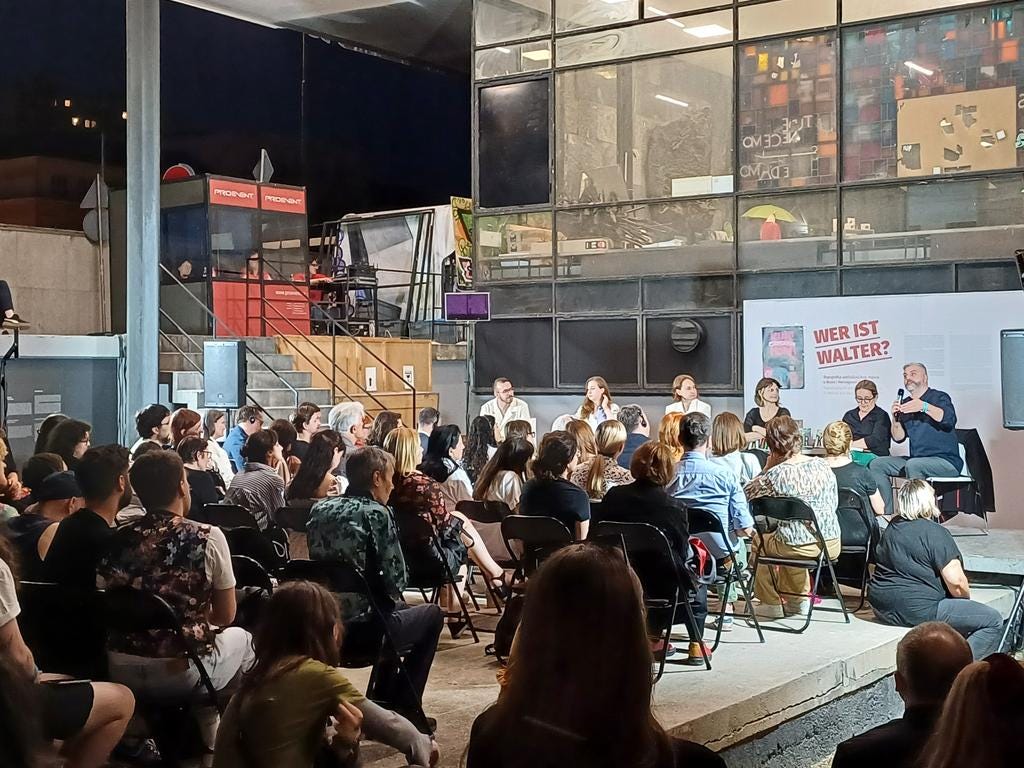A queer history of Bosnia and Herzegovina
Queer people have been part of the Bosnian society for a very long time. Balkan countries are rearming themselves, and Serbia has a problem with arsenic. Also: Roma palaces and nationalist peace songs
Hello everyone,
welcome back to Balkan Brew.
This week, Israel’s unprecedented attack on Iran and the response it triggered kept many of us worried, angry, and glued to our screens.
Koha Ditore captured it strikingly in Sunday’s caricature:
It’s been hard to focus on anything else - but that doesn’t mean life and politics in the Balkans have hit pause.
This week: the hidden history of queer lives in Bosnia and Herzegovina, the region’s silent rearmament, and arsenic-poisoned water in Serbia. But also: Budvatisation, Roma palaces, and some ridiculous endorsements.
Let’s start.
DON’T RUSH. Balkan Brew is a passion project, and this newsletter is completely free. If you enjoy what we do, share it around - it helps us a lot. And if this landed in your inbox via a friend, and you want to make sure you don’t miss the next issue, you can join the crew right here 👇
The secret life of Bosnia’s queer community
Western values, propaganda, lifestyle. In Bosnia and Herzegovina, as elsewhere, being queer often comes bundled with a heavy load of accusations, prejudice, and discrimination. But the country’s queer history runs much deeper - and much further back - than many might expect.
NOT SINCE YESTERDAY. A newly released book by Sarajevo Open Center, an LGBTQI+ rights organisation, uncovers centuries of queer presence in BiH.
NINE CENTURIES. The History of Queer Life in Bosnia and Herzegovina spans 274 pages and starts in the Middle Ages. Through historical records, newspaper clippings, private archives, books and essays, it traces queer life in the country all the way to the present.

HIDDEN IN PLAIN SIGHT. From medieval times to modern-day BiH, LGBTQI+ people have always been part of the country’s story. Historians just weren’t looking.
REIMAGINING. The book doesn’t only document facts. Through songs, memories, and fragments of daily life, it invites readers to imagine what it meant to live as a queer person in different eras - and reclaims the community’s contributions to Bosnian society.
DID YOU KNOW… when Sarajevo saw its first sex reassignment surgery? Or what it meant to hide your gender identity from your employer under Austro-Hungarian rule? Or whether people during Ottoman times were more tolerant than today?
NOW LISTEN. We spoke to Matej Vrebac, the book’s co-author and research coordinator, to hear more about what they uncovered, and what it means for Bosnia today.
A silent rearmament
In recent years, the countries of the former Yugoslavia have been ramping up their military drone numbers.
THE DRONE WARS. Countries in the region have bought drones from Turkey, China, Israel, and the UAE. Serbia and Croatia also have the capacity to build their own.

NOBODY KNOWS. While the amount of other weapons like tanks and fighter jets is supposed to be regulated by a 1996 agreement (which is, let’s be honest, often ignored), nobody really knows how many military drones are currently in the region.
POTENTIAL THREATS. Drones alone may not start a war, but their increasing presence could still pose a serious security threat - according to this 2023 report.
Vojvodina’s arsenic problem
Back in 2003, health authorities declared the water in the Serbian town of Temerin undrinkable and unfit for cooking due to high arsenic levels.
PRETEND IT’S NOTHING. But for the past 22 years, local authorities have done little to address the issue. Most residents kept drinking tap water, according to Serbia’s Ombudsman, who accused local officials of failing to protect the public.
NOT INTERESTED. The local water utility, JKP Temerin, said it provided tanked water until 2011 - but stopped because people showed “little interest.”
SOMEBODY PUT SOMETHING IN MY DRINK. High arsenic levels in Vojvodina’s groundwater have been a known issue for years. Many local administrations just don’t have the tech to properly filter the water.

ON THE RECORD. The investigative site Krik published a database with the properties and businesses of dozens of Serbian politicians. You can check it out here.
IN OTHER NEWS
The founder and the CEO of United Group - the owner of N1 - have been dismissed without any public explanation. In response, N1 journalists across the region have signed an appeal urging the majority shareholder to reaffirm their commitment to independent and professional journalism.
Operation “Free Beach”: in Durrës, Albania, police seized 182 sets of umbrellas and beach loungers in a crackdown on the illegal occupation of public beaches.
In Kosovo, 53 people are now on trial - in absentia - for the massacre of more than 300 ethnic Albanians during the 1990s.
Montenegro’s goal of joining the EU by 2028 might still be within reach.
GREETINGS FROM BUDVA. Budva, Montenegro, has basically become shorthand for unregulated urban sprawl - so much so that “budvanizacija” is now a term for cities overcrowded with buildings and lacking green space. RSE has some photos to give you the picture.
ROMA PALACES. Adevarul ran a story on the many extravagant palaces built by Roma communities in Romania since the early ‘90s - now an iconic part of that era’s architecture.
Usain Bolt just became a brand ambassador for Serbia’s EXPO 2027. Not everyone’s a fan, but hey - it has big meme potential, and we respect that.
HOW THOMPSON BECAME THOMPSON. Thompson’s massive concert in Zagreb is coming up - and it’s shaping up to be the biggest gathering in Croatia’s history. Novosti published a deep dive into how the far-right singer became normalized and reached superstar status - we also discovered a bizarre 1992 cover of “Give Peace a Chance” (of all songs!) turned nationalist anthem.
And that’s a wrap for this week! If you catch a mistake, want to add something, or just feel like saying hi, reply to this email—we love hearing from you. You can also find us on Bluesky and LinkedIn.
Until next week, stay safe
BB










